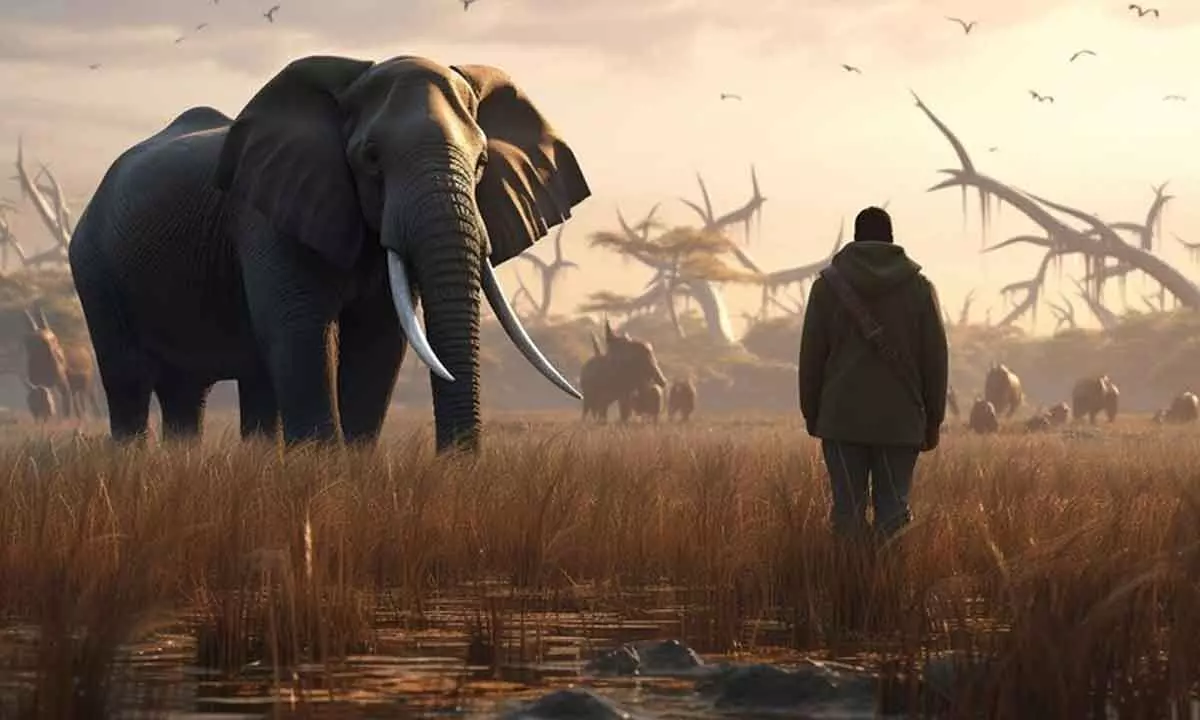Live
- Poonch terror attack: Security forces release sketches of two terrorists
- Constituency Watch: For BJP it’s fight for consolidation while Congress sees an opportunity to regain past glory in Nandurbar
- Congress, BRS, AIMIM following Muslim League agenda: J P Nadda
- PeopleStrong, Google Cloud join hands to transform employee experience with AI
- Siguler Guff invest Rs 240 crore in Hyderabad-based microfinance lender Spandana Sphoorty
- 'BJP CM will take oath in Odisha on June 10', roars PM Modi at Berhampur rally
- Five-year-old boy found dead after being swept away in Texas floodwaters
- Akhilesh appoints Shyam Lal Pal as new state president of SP
- Manipur: Educational institutions close for two days after heavy rains, hailstorm
- End of BJD rule on June 4, says Modi
Just In
Mitigate man-wildlife conflicts – on a war-footing


Of late, there has been a spurt in wild animal attacks on the humans, more so after the onset of a blistering summer season. With increasing...
Of late, there has been a spurt in wild animal attacks on the humans, more so after the onset of a blistering summer season. With increasing man-animal conflicts, governments, especially forest and local bodies, are scrambling for solutions. Alongside, even during other seasons, there have been reports of increasing wildlife intrusion into human habitations and cases of electrocution of big animals, especially elephants, due to electrification of fencing around agricultural fields. Farmers are not only losing their hard-farmed produce but also getting tangled up in legal cases whenever electrocution results in death of wildlife. Add to it, those working in fields are being attacked by wild animals including pachyderms.
For all the budgets spent on departments of forests, they failed to adequately attend to the water needs of animals or harvest rainwater, by digging up pits or pools. The gravity of the situation was starkly driven home by Tamil Superstar Rajinikanth who, exactly a year ago, appealed for water conservation on a war footing as he took part in a TV debut via Discovery channel’s ‘Into The Wild with Bear Grylls’ programme. Thalaiva urged that the water conservation should be prime focus of all levels in the government as well as at community and individual levels. He saw the situation for himself when he shot for the programme in Karnataka’s Bandipur Tiger Reserve. A few weeks earlier, the PM ventured into the Himalayan forests along with Grylls in Uttarakhand. He spoke of the need to protect forests and the wildlife. On the World Wildlife Day on March 3, 2024, the PM gave an impassioned call to celebrate the incredible diversity of life on our planet and appreciated all those who are at the forefront of sustainable practices, and supporting wildlife conservation efforts.
There has never been greater need for protecting the wildlife and the lives of humans, too, with 2024 turning out to be the hottest year in the planet history. Sloth bears, leopards, tigers and other carnivorous animals, while scouring for prey and water, are ending up in the vicinity of villages and hamlets. With gradual disappearance of water bodies, the populations of prey animals (small as well as the herbivorous) tend to move out of forests. Pursuing them, predators stumble upon humans and, hence, fatal attacks. A worrying rise in human-animal encounters is making it so tough for the forest departments to tackle the menace that the state governments are looking for ways to tame the wildlife and turn it away, back into the forest. As in the case of stray dogs, whose culling is demanded vociferously whenever a death or severe mauling occurs, rural people have been demanding and mounting pressure on governments through politicians to take up capture-or-kill operations. Last month, Kerala bowed to public pressure and became the first state in the country, to declare the man-animal conflict as a state-specific disaster. In 2015, Odisha had declared snakebite a state-specific disaster.
How does it help matters? The issue of man-animal conflict, hitherto dealt with by the forest departments under the Wild Life Protection Act, will be covered by the Kerala state disaster management authority and the Act concerned can override the Wildlife Act and no court, except, Supreme Court can intervene. How Kerala makes use of its new initiative will set the precedent for other States to follow suit.
Meanwhile, governments need to ramp up time-tested measures viz., crate buffer zones, improve biodiversity, enhance fodder plantation, curb deforestation, protect water bodies, and raise crops that repel wildlife besides solar fencing.
International Union for Conservation of Nature (IUCN) has mentioned ‘climate change and severe weather’ among 12 categories of threats to wildlife. The report must be paid heed to.

© 2024 Hyderabad Media House Limited/The Hans India. All rights reserved. Powered by hocalwire.com






